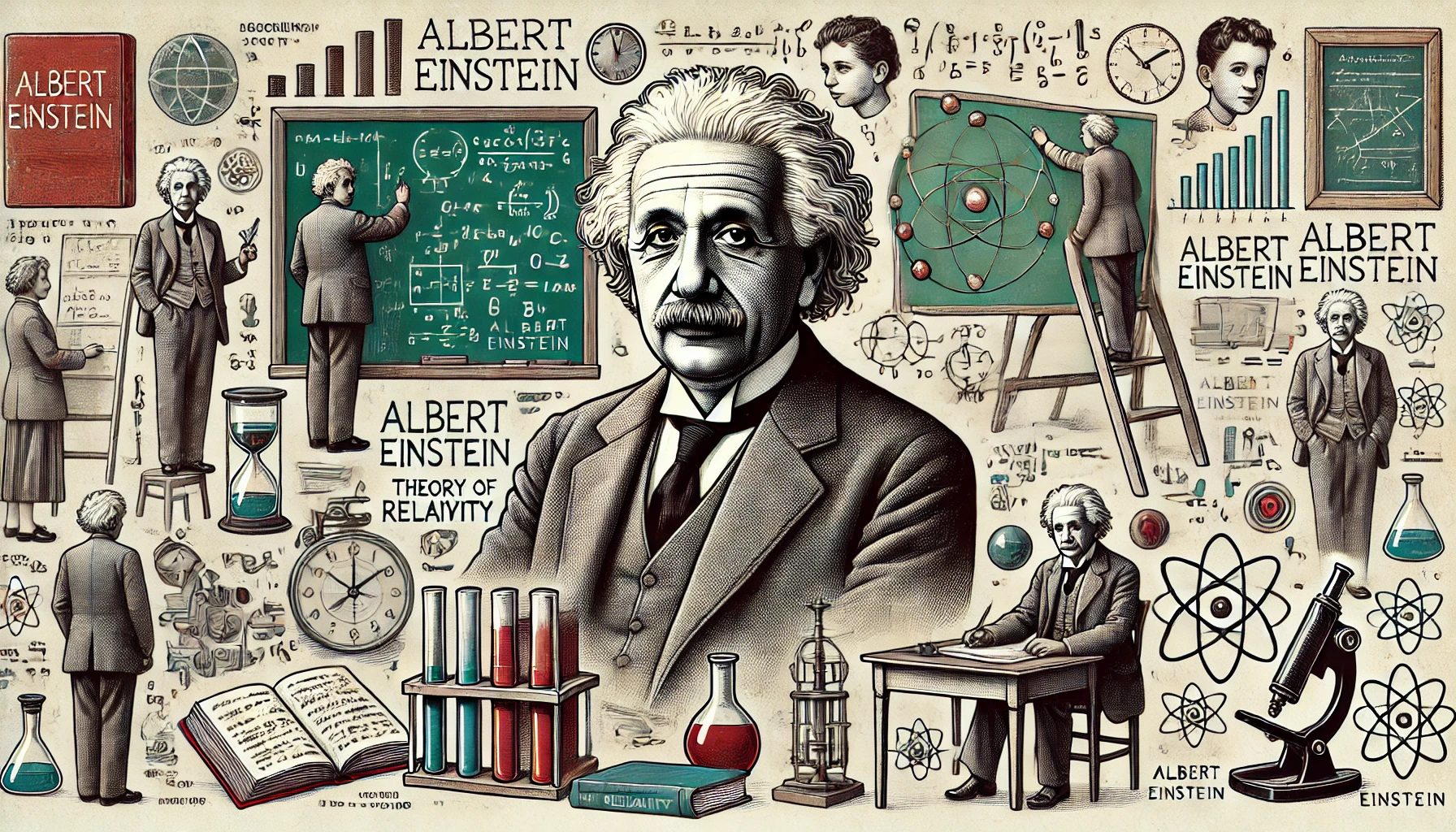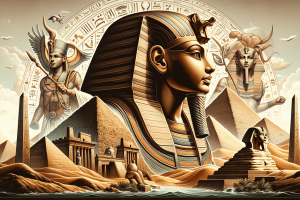The Life and Education of Albert Einstein: A Journey from Childhood to Scientific Greatness
- Posted by George Taylor (United Kingdom)
- Categories History
- Date July 22, 2024
Albert Einstein Biography: Early Life and Childhood
Albert Einstein was born on March 14, 1879, in Ulm, Germany. From an early age, Einstein exhibited a deep curiosity about the world around him, which laid the foundation for his future scientific endeavors.
Early Life
- Family Background: Einstein was born to Hermann and Pauline Einstein. His father was an engineer and salesman, while his mother took care of the household.
- Childhood Interests: As a child, Einstein showed a keen interest in mathematics and physics. Despite his curiosity, he faced challenges in the rigid schooling system of the time, which he often found stifling.
Education
- Primary and Secondary Education: Einstein attended a Catholic elementary school in Munich and later the Luitpold Gymnasium. He excelled in mathematics but struggled with other subjects.
- Higher Education: In 1896, Einstein enrolled at the Swiss Federal Polytechnic in Zurich, where he focused on physics and mathematics. He graduated in 1900 with a degree in teaching for secondary schools.
Albert Einstein’s Scientific Contributions
Einstein’s scientific contributions are numerous and have had a lasting impact on various fields of study. His most famous work is the theory of relativity, which revolutionized the understanding of space, time, and energy.
Theory of Relativity
- Special Theory of Relativity (1905): This theory introduced the famous equation E=mc², establishing the relationship between mass and energy. It fundamentally changed the understanding of space and time, showing that they are interconnected.
- General Theory of Relativity (1915): This theory expanded on the special theory, providing a new description of gravity. It proposed that massive objects cause a distortion in space-time, which is felt as gravity. This theory has been confirmed by numerous experiments and observations, including the bending of light by gravity.
Notable Discoveries and Inventions
- Photoelectric Effect: Einstein’s work on the photoelectric effect demonstrated that light can be thought of as packets of energy, called photons. This discovery was crucial in the development of quantum theory and earned him the Nobel Prize in Physics in 1921.
- Brownian Motion: Einstein provided a theoretical explanation for the random movement of particles suspended in a fluid, known as Brownian motion. His work in this area provided strong evidence for the existence of atoms and molecules.
- Einstein Refrigerator: Alongside his student Leó Szilárd, Einstein invented an absorption refrigerator that had no moving parts and used only heat as an input. Though not commercially successful, it demonstrated his ingenuity beyond theoretical physics.
Albert Einstein’s Achievements and Legacy
Einstein’s achievements extend beyond his scientific contributions. His legacy includes numerous awards, honors, and a lasting impact on both science and popular culture.
Achievements
- Nobel Prize in Physics (1921): Awarded for his explanation of the photoelectric effect.
- Copley Medal (1925): One of the oldest scientific awards, given by the Royal Society of London for outstanding achievements in scientific research.
- Time Magazine’s Person of the Century (1999): Recognized for his profound impact on science and humanity.
Albert Einstein’s IQ and Intellectual Legacy
- IQ: Estimates of Einstein’s IQ range from 160 to 180, reflecting his extraordinary cognitive abilities.
- Intellectual Legacy: Einstein’s work laid the groundwork for numerous advancements in physics and technology. His theories have been tested and confirmed in various ways, making him one of the pillars of modern science.
Cultural Impact
- Iconic Image: Einstein’s distinctive appearance and playful personality have made him a cultural icon, symbolizing genius and creativity.
- Influence on Education: Einstein’s approach to learning and discovery continues to inspire educational philosophies that emphasize curiosity, critical thinking, and creativity.
Albert Einstein Quotes: Words of Wisdom
Einstein’s insights extend beyond scientific papers. His quotes reveal his thoughts on life, learning, and the human condition.
Notable Quotes
- “Imagination is more important than knowledge. For knowledge is limited, whereas imagination embraces the entire world.”
- “Life is like riding a bicycle. To keep your balance, you must keep moving.”
- “The important thing is not to stop questioning. Curiosity has its own reason for existing.”
Fascinating Facts About Albert Einstein
- Delayed Speech: Einstein did not speak until the age of three, leading some to believe he might have developmental issues.
- Love for Music: Einstein was an accomplished violinist and found solace in music, often saying, “If I were not a physicist, I would probably be a musician.”
- Political Activism: Einstein was an advocate for civil rights, pacifism, and Zionism. He was offered the presidency of Israel in 1952, which he declined.
Albert Einstein’s Theory of Relativity
The theory of relativity remains one of Einstein’s most significant contributions to science, with profound implications for our understanding of the universe.
Special Theory of Relativity
- Principles: The laws of physics are the same for all non-accelerating observers, and the speed of light is constant, regardless of the motion of the light source.
- Implications: Time dilation and length contraction are two critical concepts arising from this theory, demonstrating that time and space are not absolute.
General Theory of Relativity
- Principles: Gravity is not a force between masses but a result of the curvature of space-time caused by the presence of mass.
- Implications: This theory predicts phenomena such as the bending of light around massive objects (gravitational lensing), the precession of planetary orbits, and the existence of black holes.
Education and Early Career of Albert Einstein
Einstein’s formal education and early career were marked by both achievements and challenges, shaping his path to becoming a renowned physicist.
Education Journey
- Swiss Federal Polytechnic: After struggling with the rigid education system in Germany, Einstein found a more conducive environment at the Swiss Federal Polytechnic in Zurich.
- Graduation and Teaching: Einstein graduated in 1900 and initially struggled to find a teaching position. He eventually secured a job at the Swiss Patent Office, which allowed him time to pursue his scientific interests.
Early Research
- Annus Mirabilis Papers: In 1905, often referred to as Einstein’s “miracle year,” he published four groundbreaking papers that would revolutionize physics. These papers covered the photoelectric effect, Brownian motion, special relativity, and the equivalence of mass and energy.
Discoveries and Inventions by Albert Einstein
Einstein’s contributions to science include several groundbreaking discoveries and innovative inventions.
Major Discoveries
- Photoelectric Effect: Demonstrated that light can be thought of as particles (photons), providing crucial evidence for quantum theory.
- Brownian Motion: Provided a theoretical explanation for the erratic movement of particles in a fluid, supporting the atomic theory of matter.
Innovations
- Einstein Refrigerator: Co-invented an absorption refrigerator that required no moving parts, illustrating his practical ingenuity.
The Legacy of Albert Einstein
Einstein’s legacy extends far beyond his scientific achievements. His contributions have shaped modern physics and influenced various fields, from technology to philosophy.
Scientific Legacy
- Quantum Mechanics: Einstein’s work on the photoelectric effect and other quantum phenomena laid the groundwork for the development of quantum mechanics.
- Cosmology: The general theory of relativity has been fundamental to the field of cosmology, influencing our understanding of the universe’s structure and evolution.
Cultural and Educational Impact
- Inspiration: Einstein’s life and work continue to inspire scientists, educators, and students worldwide.
- Educational Philosophies: His emphasis on curiosity and critical thinking has influenced modern educational practices.
Albert Einstein’s life and legacy are a testament to the power of curiosity, imagination, and perseverance. From his childhood and education to his groundbreaking discoveries and lasting impact, Einstein’s journey is a source of inspiration and admiration. By exploring his biography, scientific contributions, achievements, quotes, and more, we gain a deeper understanding of why Albert Einstein remains one of history’s most revered figures.
For more detailed information on Albert Einstein and his contributions, visit Regent Studies. To explore additional insights and historical context, refer to this external source.
Through his relentless pursuit of knowledge and his profound insights into the natural world, Albert Einstein has left an indelible mark on humanity, shaping the way we understand and interact with the universe.
Previous post




